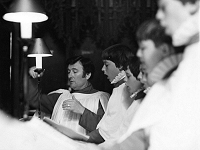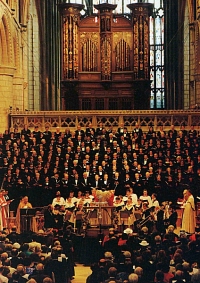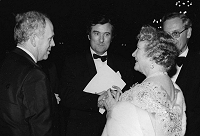About John
Sanders
Dynamic cathedral organist and composer
(Published in The Independent: 31 December 2003)
John Derek Sanders, organist and composer: born Woodford, Essex 23 November 1933;
Director of Music, King's School, Gloucester, and Assistant Organist, Gloucester
Cathedral 1958-63, Organist and Master of the Choristers 1967-94 (Organist Emeritus);
Organist and Master of the Choristers, Chester Cathedral 1963-67; Director of Music,
Cheltenham Ladies' College 1968-97; Conductor, Three Choirs Festival 1968-94; President,
Cathedral Organists' Association 1990-92; OBE 1994; married 1967 Janet Dawson (one
son, one daughter); died Hereford 22 December 2003.

John Sanders with the Choristers of Gloucester Cathedral
As Organist and Master of the Choristers at Gloucester Cathedral and Conductor of
the Three Choirs Festival for over a quarter of a century, John Sanders enriched
the world of music far beyond the normal confines of the provincial organ loft.
Organist, conductor, composer, teacher, adjudicator and, not least, an assiduous
administrator, this multi-faceted musician influenced and nurtured the lives of
many generations of aspiring musicians.
Born in Woodford, Essex, in 1933, Sanders won a music scholarship to Felsted School
before, in 1950, moving to the Royal College of Music, where he studied with Sir
John Dykes Bower. Two years later he moved to Cambridge to read Music, becoming
Organ Scholar at Gonville and Caius College. In 1955, by examination, he became
a Fellow of the Royal College of Organists.
John Sanders began his cathedral career in 1958 when he was appointed Assistant Organist
of Gloucester Cathedral and Director of Music at the King's School. Moving north
in 1963 to become Organist and Master of the Choristers at Chester Cathedral was
to prove particularly propitious. Here he not only met his future wife, but started
playing a pivotal role in the musical life of the diocese as well as becoming Artistic
Director of the Chester Festival.
The retirement, in 1967, of his musical mentor, Dr Herbert Sumsion, the long-serving
Organist of Gloucester Cathedral, offered him the perfect platform for his emerging
talents. Dynamic and diverse, as before, Sanders also made his mark within the local
community, conducting both the Gloucestershire Symphony Orchestra and Gloucester
Choral Society. In 1968, he succeeded Sumsion as Director of Music at Cheltenham
Ladies' College.
As a recitalist, Sanders particularly rejoiced in British organ music of both the
19th and early 20th centuries. As his recordings illustrate, his playing was fiery
and impassioned, his sense of rhythm matched by a love of colour, all solidly underpinned
by a splendidly natural technique. As a choral technician, he was solid and musicianly,
exacting and demanding by degrees. He expected, and gently obtained, the highest
standards in choral technique be it amid the intimacy of the cathedral choir or
the vast resources of larger choral groups.
Equally adept as a composer, his particular feel for the liturgy allowed him to write
well for voices. Here his anthems, services, chants and choral works, often written
for special occasions, have retained their place in the repertoire. Liturgical pieces
include an early Festival Te Deum (1962), Te Deum (1985), Jubilate
Deo (1986), Two Prayers (1988), A Canticle of Joy (1991),
The Reproaches (1993) and the more extended St Mark Passion (1993).
For the organ he essayed the contrasting Soliloquy (1977) and Toccata
(1979).

Opening Service of the 1992 Gloucester Three Choirs Festival
The role of Organist of Gloucester Cathedral automatically thrusts its holder into
the maelstrom of music that is the Three Choirs Festival. In partnership with his
fellow organists at Hereford and Worcester Cathedrals, the Organist at Gloucester
has triennially the responsibility for planning and performing the music for what
is now a week-long cultural festival held at each venue by rotation. Dating back
to 1715 and, for many years, dominated by the venerable presence of Sir Edward Elgar,
the festival has moved forward in a most positive manner, thanks in no small part
to such as John Sanders.
In charge of nine Gloucester festivals during his long tenure as Organist, for almost
20 years, from 1975, he formed a unique and stable artistic triumvirate with Roy
Massey at Hereford and Donald Hunt at Worcester. Friends as well as colleagues,
their relationship was solidly underpinned by a trust and respect and it was Hunt
who, looking back, later wrote that "it was one of the happiest associations that
could be imagined!"
Ably assisted by his wife Janet, who sang soprano in the Festival Chorus, Sanders
took meticulous care with everything with which he was involved, be it a piece of
administration or a performance of the Verdi Requiem. It was to Sanders
that the honour fell of conducting the 250th festival in 1977, and one for which
he was admirably equipped, though he possibly did not realise it at the time.
In the Silver Jubilee Year the festival committee had commissioned a Mass of
Christ the King from the Master of the Queen's Musick, Malcolm Williamson,
to be dedicated to the Queen. Regrettably the work failed to be completed on time.
Amid an encircling media frenzy, in choosing to perform the work as it then stood
Sanders adroitly rescued a difficult diplomatic situation, with his reputation rightly
enhanced, as the Musical Times reported:

John Sanders in 1978 with Her Majesty Queen Elizabeth the Queen Mother and Malcolm
Williamson following the second performance of Williamson's Mass of Christ the King
in Westminster Cathedral
"Mr Sanders is the figure to emerge with honour. His public statements
attributing the affair to the strain under which Mr Williamson was working in Silver
Jubilee Year were restrained and dignified, and an hour before the concert he was
still insisting at a press reception that there were no recriminations.
It was indeed Mr Sanders's festival. He was, to borrow an expression
from one-day cricket, the man of the match. Not only did he approach the new Mass
with zeal and devotion in difficult conditions; during the week he turned in a series
of performances, which emphasises how much he grows in authority with every festival.
It was largely down to him that the 250th anniversary had so much that was illustrious."
President of the Cathedral Organists' Association in 1990, in the same year he was
awarded a Lambeth Doctorate for services to cathedral music; appointment as OBE
followed in 1994 as he quietly retired from cathedral life, and, three years later,
he was honoured with the title Organist Emeritus.
Revelling in his new freedom amid the splendour of his Herefordshire rural retreat,
John Sanders now returned to composition with renewed vigour, keen to explore new
artistic directions. Set against the muscular robustness of the 1995 cantata Gloucester
Visions and Urbs Beata, which explores the incomparable acoustics
of Gloucester Cathedral for the 2001 festival, is a particularly poignant Requiem
for a cappella choir. Amid its six movements is a gentle Berceuse, dedicated
to the memory of his first granddaughter, Celia, who was born severely disabled
in January 1998, and who died aged only six months old.
Modest in outlook but substantial in commitment, John Sanders was, by training, profession
and instinct, the guardian of a great English tradition and, while his supreme gifts
gave his music an unforgettable quality, above all it was his humility and natural
goodness that shone through to bring added distinction to a rich and fulfilling
life.
Kenneth Shenton
(reprinted by kind permission of The Independent)